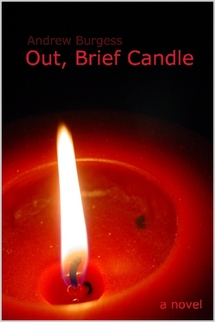 On the one hand, I’m feel like I’m the last person to give advice on how to write a good novel. On the basis of sales alone, this is certainly true. On the other hand, I have actually managed to produce one (Out, Brief Candle – currently free to download for Kindle to celebrate this post!), so maybe it’s worth a word or two on the experience.
On the one hand, I’m feel like I’m the last person to give advice on how to write a good novel. On the basis of sales alone, this is certainly true. On the other hand, I have actually managed to produce one (Out, Brief Candle – currently free to download for Kindle to celebrate this post!), so maybe it’s worth a word or two on the experience.
My diary entry for 26th May, 1986 contains my first-ever throwaway mention of the idea of attempting a novel. Little did I realise then quite how long it would take me (almost 20 years) and how much I would change in the course of writing it (a lot).
Here’s how it was for me.
In my case, I started with a theme. I was inspired by a quote from a book called The Shape of Chaos by David Helsa. It went something like this:
There can be little or no communication between man and man, for words are the names of memories, and no two men have the same memories.
As a language student at the time, I was fascinated by Helsa’s idea of the difficulty involved in genuine communication and I wanted to explore it further. I decided there and then to make this the crux of my story.
So far so good. I started to think this novel-writing stuff wasn’t such a big deal after all.
Then came genre and setting. I thought a lot about this, but my late-teenage lack of life experience meant I only felt qualified to write about an imaginary world where I couldn’t be too wrong about things – so I chose to set the novel in the near-future and ended up with science fiction.
Next, I started thinking about plot, characters and general planning. At this point, I reckon I lost about five to eight years during which I graduated, started work, moved house a few times, got married, ruminated about my imaginary world a lot, and wrote embarrassingly little.
 The breakthrough came in my late-twenties, when I got fed up with all the thinking, mulling and pondering, and realised I just needed to get the hell on and write something. This turned out to be a revelation. I wrote unhindered by preconceptions of where my story was going; instead, I did it just to find out what would happen next. It was like reading a story I’d never read before, watching it being told as it appeared on the screen in front of me line by line. I learned about characters as I created them. I explored settings as they came to me. It was both freeing and exciting. It was also productive. Despite the demands of family life and eventually three children, the bulk of Out, Brief Candle was written in the following few years on a series of small personal organisers, starting with a tiny Psion Series 3c (pictured) and ending with the big daddy of them all – the Psion Series 7.
The breakthrough came in my late-twenties, when I got fed up with all the thinking, mulling and pondering, and realised I just needed to get the hell on and write something. This turned out to be a revelation. I wrote unhindered by preconceptions of where my story was going; instead, I did it just to find out what would happen next. It was like reading a story I’d never read before, watching it being told as it appeared on the screen in front of me line by line. I learned about characters as I created them. I explored settings as they came to me. It was both freeing and exciting. It was also productive. Despite the demands of family life and eventually three children, the bulk of Out, Brief Candle was written in the following few years on a series of small personal organisers, starting with a tiny Psion Series 3c (pictured) and ending with the big daddy of them all – the Psion Series 7.
Then came the train crash. I wrote thousands of words and had a great time producing them, but I also had a mess on my hands: plot strands that didn’t link, inconsistencies everywhere, character flaws and unexplained events by the bucketload. If I ever wanted to reach the end, I knew I had to start taking things seriously. I started re-imagining and re-describing my characters, now I knew who they were. I created a long overdue timeline of the principal events. I drew out my settings and created backstories where I realised I didn’t know them. And finally, I decided how my story would end, and I worked out what I needed to do to get from here to there. It was a different way of writing and it took a while, but it was worth it.
This gear-change was the best decision I ever made. Without it, I would never have extracted myself from the dog’s dinner I’d created.
I finally wrote my last few words in 2002. I made a pact with myself not to fiddle with the text any further – however strong the urge – printed out a clean copy, and optimistically sent it to myself via registered post as proof of copyright.
When I read Out, Brief Candle now, I can hear myself change over the years it took to write. It’s a story in two parts, and Part Two could easily have been written by some new guy drafted in to replace the author of Part One, who was presumably too exhausted to continue. Despite its many flaws, I’m very proud of it. If you’re out there wondering whether to write something of your own, I’d definitely give it a go. But remember that – like me – you might end up being in it for the long haul.
*I’m afraid I’ve lost the exact original quote, but it went very much like this: “Man longs for knowledge but he has only the words of his speech to use, and these are inadequate. There can be little or no communication between man and man, for words are the names of memories, and no two men have the same memories. Moreover, words are little-suited to knowledge since each word is surrounded by the undertones of its own history. Finally, words are inadequate for piercing the essence of reality, since they are merely the indicators of our own memories and these being merely contingent can no more get at the true reality than a spider that has put its nest in the corner of a palace can get at the total reality of the palace.”

What a great read, thanks for sharing this Andrew!
(quite inspiring, and I may just start putting finger to keyboard again!)
I am intrigued by the David Helsa reference:
“There can be little or no communication between man and man, for words are the names of memories, and no two men have the same memories.”
This is a very similar line of thought to *Burroughs’ “Language is a virus” threads, and I’d like to read more… the only problem is I can’t find any David Helsa books online – help? 🙂
Apologies now – I’ve still not started your book yet, despite downloading it a few weeks ago now, but I will certainly start it this evening.
All best – and keep posting!
Paul
* I can’t remember if you remember, but my passion for W.S.Burroughs work has grown & grown as the years have gone on. I am now the proud owner of a very nice collection of books & artefacts including the great man’s autograph, and several 1st edition hardbacks 🙂
LikeLike
Thanks, Paul. Burroughs is someone I’d really like to look at more. He’s on my reading list, so I may be coming to you for some advice at some point!
LikeLike
Found it! 🙂
David H. Helsa, The Shape of Chaos: An Interpretation of the Art of Samuel Beckett Minneapolis: University of Minnesota Press, 1971
LikeLike
I do actually have a copy, but I think it’s out of print. I’ve looked through it again…just still can’t find that quote! As for Beckett, he’s my Burroughs 🙂
LikeLike
Ah yes, I have “Molloy” to listen to as my next book on Audible 🙂
LikeLike
Very helpful. I’m pondering writing a book. I’ve an idea, some background info and character ideas/profiles. Little else. A timeline is a great idea. Thank you. Before I end up in knots x
LikeLike
inspired me to dig out some of my old writing and see what I can make of it. 🙂
LikeLiked by 1 person